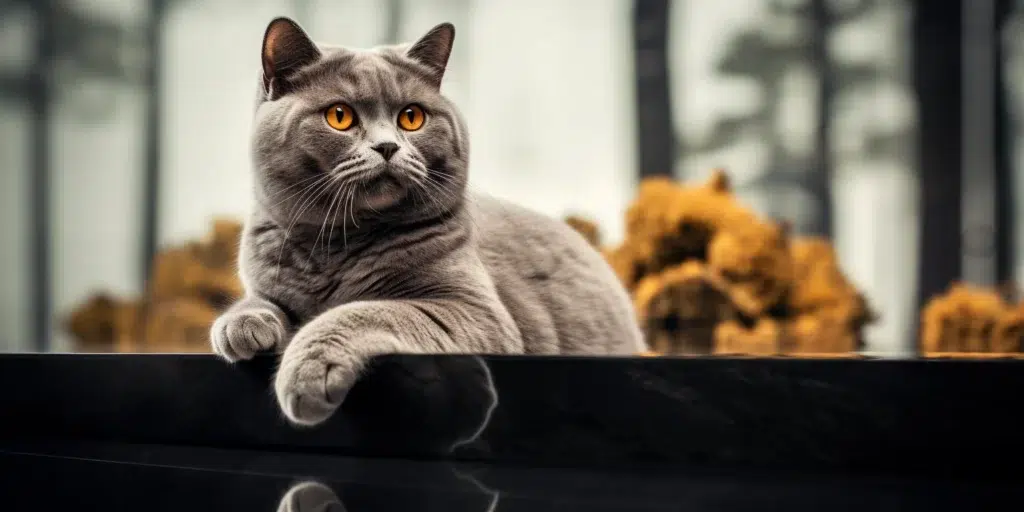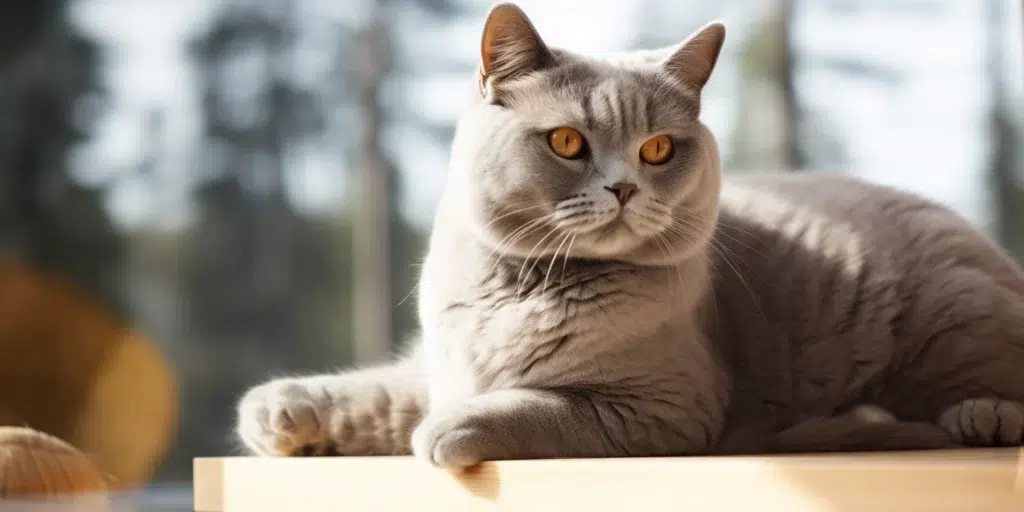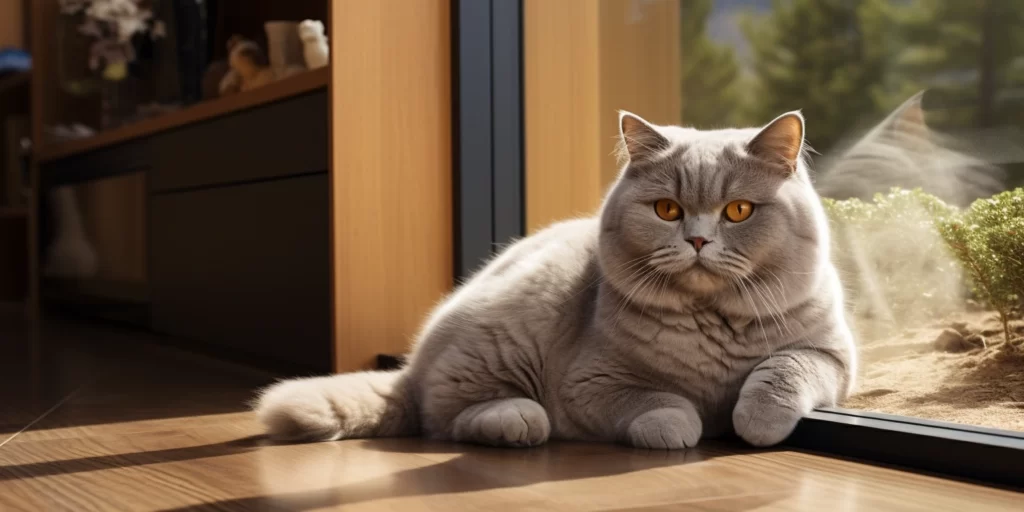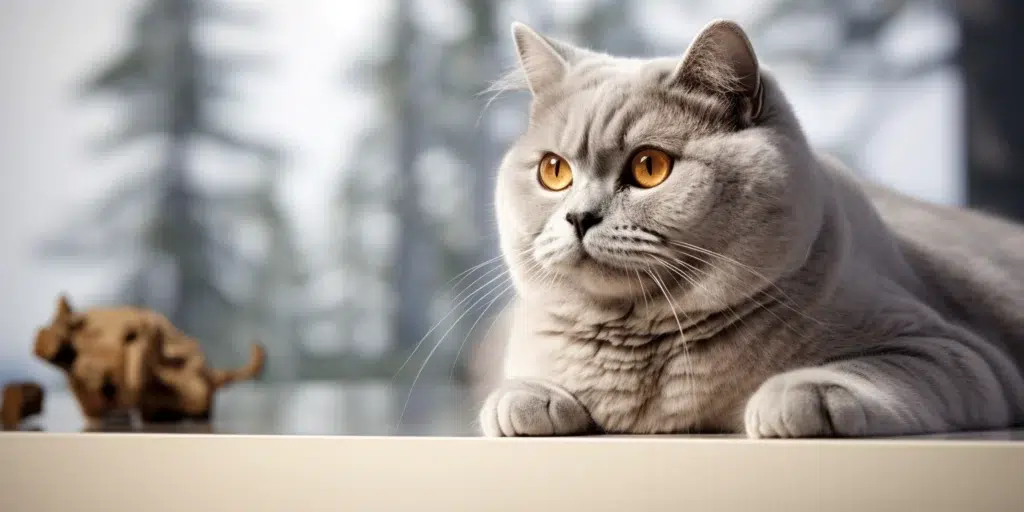If you’re looking for an affectionate and loyal pet, look no further than the British Shorthair cat. This lovable teddy bear of a cat is an ideal companion for any family home. With their chubby cheeks and laid-back demeanor, it’s easy to see why this breed has been around since the days of ancient Rome.
The British Shorthair is known for its calm nature, making it great for families with young children or other pets in the house. While they aren’t as active as some cats, they do still enjoy playing with toys like toy mice or balls. They also love snuggles and belly rubs!
Despite their gentle nature, they can be quite independent at times, so you will need to understand this breed to properly care for them. However, if you show them lots of love and care, then they will certainly return it tenfold!
With the right knowledge, you can create the perfect home for your British Shorthair, providing them with all the love and care they need to stay happy and healthy! So let’s begin!
Breed Overview

The British Shorthair is a powerful, muscular breed of cat that is known for its luxurious fur and friendly, laid-back nature. This breed has a short but dense coat of fur that comes in a wide variety of colors and patterns.
The British Shorthair’s origins can be traced back to England during the Victorian era when cat shows began to become popular among fanciers. At these early shows, most cats were simply described by their coat type or color as there were few pedigreed cats exhibited at the time.
However, due to their distinct features, fanciers quickly took notice of the British Shorthairs being displayed at these shows. They then began breeding them according to specific standards to make the breed even better.
In 1967 they were accepted by the American Cat Association followed by Cat Fanciers Association accepting them in 1980. This opened up new opportunities for more widespread recognition by other cat associations.
Today these loyal companions make wonderful pets that many love to own. Their independent nature allows them to act like the kings of the home while being cuddly and sweet to their owners.
Whether you’re looking for a playful purr-pal or just need something cuddly, it’s hard not to fall in love with this cute little bundle of fluff!
Identifying British Shorthair Cat
The British Shorthair Cat is a powerful, medium to large-size feline with a broad and full chest. The coat of this breed is particularly dense yet soft to the touch, giving it an extremely luxurious feel.
This breed has a distinctive round head shape featuring short noses, chubby cheeks, and prominent whisker pads. This gives it an enigmatic smiley face look that many cat lovers find endearing. The ears are rounded at the tips while they sit relatively high on its head in comparison to other breeds.
British Shorthairs have large eyes with deep round shapes that can range in various colors like gold and copper. The pointed variants usually come with blue eyes and the silver variants come with beautiful green eyes.
Their legs are notably shorter than other breeds but remain strong enough to support their muscular bodies. This feature makes them appear heavier than other cats despite not necessarily carrying any extra weight around them!

The tail is just as thick as its body; however, it does taper slightly towards the tip making for an aesthetically pleasing. With its striped pattern, the tail makes this cat even more beautiful.
All these physical traits give the British Shorthair breed an unmistakable look – one that will always be recognized no matter what color or pattern they come in!
Personality Traits
The British Shorthair is an intelligent, loyal and devoted companion. They enjoy attention from their owners but do not actively seek it out as some other breeds might. They are gentle and calm, yet they can have their mischievous moments when they feel like playing the clown.
Males tend to be more outgoing than females who are more serious in nature. Females expect proper etiquette from those whose attention they accept. These cats know how to command respect while still being welcoming of attention from everyone.
British Shorthairs are content with their own company, quietly amusing themselves in your absence and waiting patiently for your return. They make great indoor cats due to their low activity levels but will still need some toys or playtime.
British Shorthairs are known for being gentle and loving, making them the perfect pet for families with children. This breed is very patient and forgiving when it comes to interactions with children. Especially those who treat him politely and with respect.
They love the attention they receive from kids and are willing to put up with even clumsy toddlers. However, you must supervise young children when they’re interacting with the cat to ensure the safety of everyone involved.
When it comes to other cats and dogs, British Shorthairs can get along well if introduced properly. If you have another pet in your home, such as a dog or another cat, then introducing them slowly and controlled will help create a harmonious relationship between all of your furry family members!
These genial British cats make excellent pets for any family looking for a loving companion who is easy-going yet loyal at the same time! They offer plenty of affection in an undemanding manner so you’ll never be lacking in cuddles once you bring one home!
Activity Level
The British Shorthair is a relatively low-maintenance cat that requires only moderate activity to stay healthy and happy. While they may not be the most active cats, they do enjoy occasional playtime with their humans. They also play with interactive toys like feather wands or laser pointers.
They love to explore and can benefit from daily play sessions that allow them to express their natural curiosity. British Shorthairs are also known for being companions who quietly snuggle up beside you on the sofa instead of demanding your attention constantly like some other breeds.
British Shorthair Cat Loyalty
The British Shorthair cat is known for its loyalty and devotion to its owners. This breed forms strong bonds with its humans, making them an ideal companion for anyone looking for a loving, affectionate pet.
These cats are also very intelligent animals who can be trained to use a litter box, follow basic commands, and even do tricks. They are social creatures who enjoy interacting with people as well as other pets in the home. Because of their friendly nature, they often become the center of attention when visitors come over.
British Shorthairs will show their gratitude through purring or snuggling up close during cuddle time. They may even bring you gifts like dead mice or birds they have caught! Their loyalty is unmatched; these cats will always be there when you need them.

Love Of Water
While many cats will try to avoid water at all costs, British Shorthairs actually seem to enjoy it! Many owners report that their cats are more than happy to jump into the bathtub with them or splash around in a shallow bowl filled with lukewarm water.
Not only does this make for some hilarious moments, but it also helps ensure that your kitty stays clean regularly as well! Keep in mind that you should introduce them to water at an early age so they get used to getting wet.
It’s important not to forget about safety when bathing your British Shorthair. Use only warm (not hot) water, keep an eye on them at all times, and don’t forget about using special shampoos formulated just for cats.
If done correctly and safely then you can be sure that bathing time will be both enjoyable – and beneficial – for both you and your furry friend!
Trainability
The British Shorthair is an intelligent, biddable breed of cat. These cats are known for their good-natured personalities, making them a great choice for those looking to train their pets.
While they may not be able to complete the same feats as more active breeds, they can certainly learn some basic tricks and commands. With patience and persistence along with positive reinforcements, you can train your cat to a few tricks or commands.
While fancy tricks may not be in the cards for these gentle giants, it is still possible to teach them some positive behaviors. With consistency and positive reinforcement, even the most stubborn British Shorthair can learn some basic tricks.
Adult Size
British Shorthair cats are a large and powerful breed, with a solid and muscular build. They have a medium to large size, with adult females weighing 8 – 11 pounds and adult males weighing 10-16 pounds.
In terms of height, British Shorthairs tend to be quite tall – standing at around 10 inches or more in adulthood. This makes them one of the taller breeds among domestic cats!
They also have an average length that ranges between 14 and 16 inches long from nose tip to tail end. This lends them an impressive yet stocky build that is sure to turn heads wherever they go!
Their growth rate is something to behold! It almost seems like they grow before your eyes. As kittens, they have a very rapid growth rate, often doubling their weight in the first month of life. Kittens typically weigh 3 – 6 pounds when they are ready to leave for new homes at 3 months old.
During juvenile adulthood (around 4-7 months) their growth slows down significantly as they reach nearly full size. But they also continue to gain some muscle mass until about one year of age.
After that, the British Shorthair’s growth rate plateaus until around two years of age when it begins to slow again as the cat reaches its full adult size and maturity level.

Life Expectancy
The British Shorthair’s life expectancy ranges between 12 – 20 years, making them great companions for many years to come. To ensure your cat reaches their maximum lifespan, it’s important to provide them with the proper nutrition, exercise, and veterinary care.
A balanced diet is essential in giving your British Shorthair the best chance of living a long life. Make sure you are feeding your cat quality food that meets their nutritional needs as well as cat supplements.
Exercise should also be taken into consideration when caring for a British shorthair. These cats are calm so you might need to put in some work to keep them active.
Additionally, regular vet visits are key in keeping an eye on any potential health issues so that they can be addressed before becoming more serious problems down the road.
Following these simple guidelines will not only help keep your furry friend happy but also maximize their life expectancy – allowing you to enjoy many years together!
British Shorthair Care
Caring for a British Shorthair cat is essential to keeping them healthy and clean. One of the most important steps in caring for your British Shorthair is combing its short but dense coat. This can be done once a week with a wide-toothed cat comb.
This will help reduce shedding during shedding seasons, as well as keep their fur looking sleek and shining. Cats are usually capable of grooming themselves but coming is to protect your furniture from excessive fur.
Unless they get too dirty from outdoor activity, most owners don’t need to worry about bathing their cats. But if you want them to smell their best and look fluffy then you can bathe them if they like.
Other aspects of their care involve regular nail trimming (every two weeks or so), cleaning their ears regularly, and brushing their teeth with vet-approved pet toothpaste. A tall scratching pole is also recommended for these felines since it helps satisfy their natural instinctive urge to scratch things around them.
You should also check your feline’s eyes periodically for any signs of infection or discharge. If you neglect this step there is a high chance that it gets infected and causes bigger problems.
If eye or ear discharge is out of control you should seek veterinary advice immediately. Heavy discharge is not normal and is a sign that your cat has a problem. Even without a serious problem, it’s always best to visit a vet for regular checkups. This will go a long way in maintaining optimal health levels in older ages.
By following these guidelines consistently you can easily keep your beloved British Shorthair cat groomed and clean at all times!

Diet
British Shorthair is calm, which means that they need less food than other breeds of comparable size. To ensure your cat is receiving the best nutrition possible, you should feed them two meals per day. Feeding should be on a regular schedule with high-quality wet food containing more meat protein.
Free feeding should be avoided as it can lead to overeating and unhealthy weight gain. Similarly, treats should only make up 10% of a British Shorthair’s diet. Try to reserve these snacks for special occasions or as an occasional reward when training your cat.
Opt for natural treats like freeze-dried salmon strips instead of sugary biscuits or paste-like products. Natural treats have no sugar(carbohydrates) or preservatives, making them a perfect healthy treat.
More importantly, fresh water must always be available for them to drink. British Shorthair cats need plenty of fresh, clean water to stay healthy. The best way to ensure that your cat is getting enough hydration is by placing a few bowls around the house.
Make sure the bowl is not too shallow or too deep as they don’t like either one. Also, it is important to change the water daily to prevent diseases. You can also invest in a filtered water fountain to make sure your cat drinks clean water at all times.
Exercise Requirement
British Shorthairs can be lazy at times which means you should keep them active by playing with them. This is an essential part of their overall health and well-being. Regular physical activity helps keep your British Shorthair healthy in more ways than one.
Exercise can help them maintain a healthy weight, as well as relieve boredom, reduce stress and prevent destructive behavior from developing. Also, exercise will help strengthen their muscles, bones, and joints which will in turn improve flexibility and agility.
Interactive play is a great way to bond with your British Shorthair while providing it with necessary physical activity. This could include using toys like laser pointers or feather teasers.
Shedding Levels
British Shorthair cats have low shedding levels, but they are not ideal cats for those who suffer from allergies. Compared to other breeds, they shed very little consistently and can be groomed easily with minimal effort.
During the spring and fall, however, British shorthairs do experience seasonal shedding that requires more frequent grooming sessions. It’s best to monitor their shedding patterns to adjust the number of brushes they need.
Kittens tend to shed most heavily due to rapid growth spurts in their first year of life. Similarly, senior cats also shad heavier, especially during shedding season.

Health Issues
British Shorthair cats are susceptible to the same diseases as other cats, such as respiratory infections and parasites. However, they are especially prone to HCM (hypertrophic cardiomyopathy), which is a genetic heart disease that can lead to heart failure and death if left untreated.
Other common health issues for British Shorthairs include dental problems, obesity, bladder stones, and kidney disease. You should take extra care to schedule regular veterinary check-ups and screenings to catch any of these diseases early on.
A poor diet and living conditions can significantly affect the health of a British Shorthair cat. Without proper nutrition, cats may become malnourished, leading to an increased risk for infections, metabolic diseases, and other illnesses. Similarly, an unclean environment can facilitate the spread of parasites and bacteria which may lead to further health issues.
Providing a balanced diet and proper care will ensure a healthier cat. Annual veterinary visits are also a key component in promoting good health for your pet.
Buying Tips
- Look for a Reputable Breeder: When looking for a British Shorthair kitten, it’s important to find a reputable breeder who is knowledgeable about the breed and can provide you with health information about the parents and litter.
- Check the Kitten’s Health History: Ask your breeder to provide you with detailed records of any veterinary visits that were done on the kitten before taking them home. This will give you an indication of their overall health and help avoid potential issues down the road.
- Observe the Kitten’s Temperament: When meeting your new kitten, take some time to observe its behavior around people and other animals to get an idea of its personality type before making a decision. A healthy, well-socialized cat should be confident and inquisitive while also being gentle and affectionate towards humans.
- Consider Your Lifestyle: Before bringing home your new pet, make sure your lifestyle is compatible with owning a British Shorthair cat so that both of you can enjoy many happy years together! These cats need plenty of love, attention, care, exercise (such as playtime), proper nutrition, grooming sessions, and regular vet checkups to thrive.
You Might Like: 250+ Amazing British Shorthair Cat Names & How To Select One!

Conclusion
Having a British Shorthair is a great way to bring joy and companionship into your home. They are gentle, loving cats that enjoy spending time with their owners. Their unique personalities make them stand out from other cats, and they have an easygoing nature which makes them perfect for any household.
They require minimal grooming and are relatively low maintenance compared to other breeds of cats. Consider getting a British Shorthair if you’re looking for an affectionate, loyal companion that will remain devoted to you throughout your life.